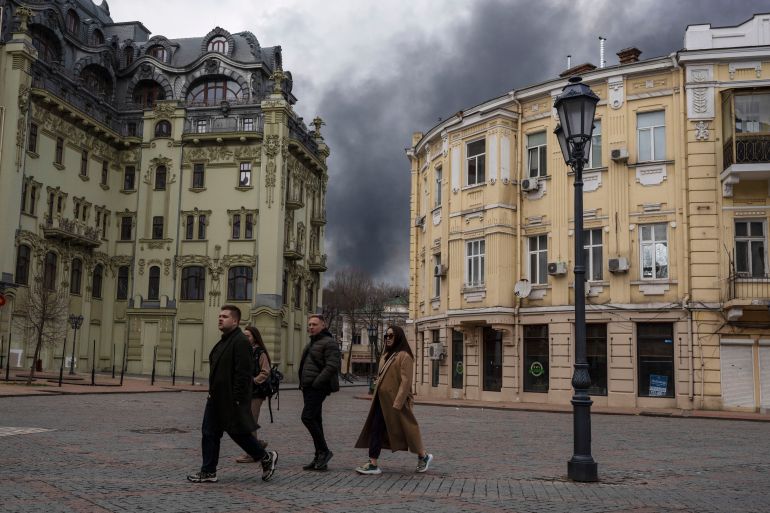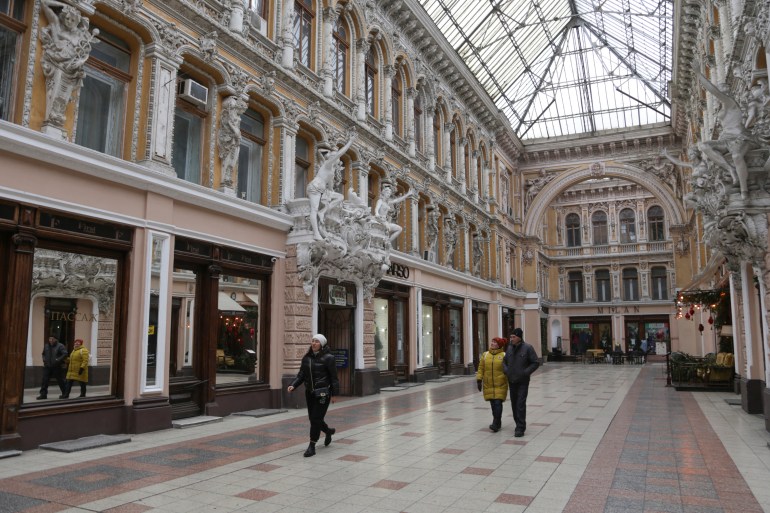UNESCO designates Odesa as World Heritage site amid war threats
The decision is designed to protect the ‘outstanding universal value’ of the historic Black Sea port.

The United Nations’ cultural agency has decided to add the historic centre of Ukraine’s Black Sea port city of Odesa to its list of World Heritage sites to recognise “the outstanding universal value of the site and the duty of all humanity to protect it” as the city faces the threat of destruction.
The 21 member states of UNESCO’s world heritage committee approved the decision with six votes in favour, one against and 14 abstentions.
Keep reading
list of 4 itemsUkraine eyes fighter jets after tanks: ‘This is what we want’
US will send dozens of Abrams tanks to Ukraine, Biden announces
ECHR says it can hear case against Russia over MH17 downing
Russia, which invaded Ukraine in February last year and has bombed Odesa several times, tried to delay the vote repeatedly.
“While the war continues, this inscription embodies our collective determination to ensure that this city, which has always surmounted global upheavals, is preserved from further destruction,” UNESCO Director-General Audrey Azoulay said after the decision.
Ukrainian President Volodymyr Zelenskyy, who requested the listing in October, welcomed the designation.
The status is aimed at helping protect Odesa’s cultural heritage, and enabling access to financial and technical international aid.
“Today Odesa got UNESCO protection,” Zelenskyy wrote on Twitter.
“I’m grateful to partners who help protect our pearl from the Russian invaders’ attacks.”
‘Glorious historical past’
Founded in the final years of the 18th century near the site of a captured Ottoman fortress, Odesa’s location on the shores of the Black Sea turned it into one of the most important ports in the Russian empire.

Its status as a trading hub brought significant wealth and made it one of the most cosmopolitan cities in Eastern Europe.
The city’s most famous historic sites include its Opera House, which became a symbol of resilience when it reopened in June 2022, and the giant stairway to the harbour, immortalised in Sergei Eisenstein’s 1925 silent film Battleship Potemkin.
Although Odesa suffered significant damage in World War II, its famed central grid square of low-rise, 19th-century buildings survived mostly intact.
Since the Russian invasion, Ukrainians have rushed to protect the city’s monuments and buildings with sandbags and barricades.
In July 2022, parts of the large glass roof and windows of the Museum of Fine Arts, inaugurated in 1899, were destroyed.
UNESCO said that it had already helped with repairs to the building, as well as to the Odesa Museum of Modern Art, which has also been damaged in the conflict.
In Moscow, Russia’s foreign ministry accused a group of Western countries of pushing through what it called a “politically motivated” decision in violation of standard procedures.
“It was prepared hastily, without respecting the current high standards of UNESCO,” the foreign ministry said, stressing that just six countries voted in favour.
Moscow pointed to “the glorious historical past of Odesa as part of the Russian state” and insisted that “the only threat” Odesa faced was from “the nationalist regime in Ukraine” which had taken down a number of monuments in the city.
Following a poll of residents, city authorities last year removed a monument to the Russian Empress Catherine the Great, seen as the city’s founder, as part of ‘de-Russification‘ efforts.
Ukraine has argued that the city, the third largest in the country, thrived long before Catherine the Great’s arrival and that Odesa dated back to the 15th century when it was known as Hadzhybei.
Ukraine is not a member of the UNESCO committee, which is currently chaired by Saudi Arabia.
Under the 1972 UNESCO convention, ratified by both Ukraine and Russia, signatories undertake to “assist in the protection of the listed sites” and are “obliged to refrain from taking any deliberate measures” which might damage World Heritage sites.